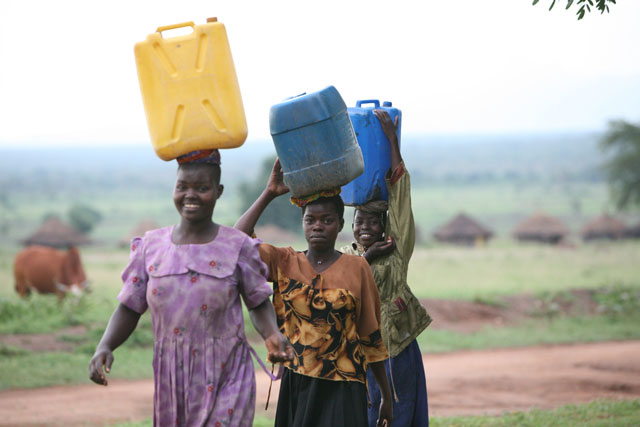
Wakiso, Uganda | Xinhua | For Betty Kyabajje, 28 years old, fetching water is an everyday struggle. Like in many African families, women are in charge of finding water, a resource their families need to survive — for drinking, cooking, sanitation, and hygiene.
Kyabajje, who lives in Bukasa, a slum area neighboring the Ugandan capital Kampala, used to spend hours queuing for water at a hand dug well in her neighborhood.
She told Xinhua in a recent interview that the waiting was a burden as she had other house chores like washing clothes and preparing meals for her family of five.
The well, which is sometimes flooded with runoff rainwater, is a “death trap” as the water is contaminated that might transmit water-borne diseases, according Kyabajje.
“The water situation was bad, very bad. You walk a long distance to get water, sometimes as women we are carrying a child on the back. Then you also find a long queue at the well,” said Kyabajje.
Bukasa slum, according to local leaders, has over 60,000 residents who all depend on such shallow wells, most of whom neighboring a swamp on the shores of Lake Victoria.
The Ugandan Ministry of Health figures show that the country loses 400 people daily from water-borne infections like diarrhea, dysentery, cholera and typhoid.
Kyabajje and her village mates are now better off because a new protected spring well has been constructed in their neighborhood.
Chinese families, who experienced such struggles when China faced extreme poverty, constructed the well, an addition to the over 20 others constructed elsewhere in Uganda.
“We are lucky because of our good government in China … I think it is good that our Chinese families especially (those) living in Uganda will also give a hand to our Ugandan friends,” said Zhong Shuangquan, a Chinese national who has been living in Uganda for over 23 years.
Zhong, who had come along with his family at the handover of the well to the community, invited other Chinese to join him in doing more things for the Ugandan families.
“Clean water is something that should be a fundamental basic of everyone’s life, so I think by giving them a well, it should help everyone here to be able to drink clean water,” said Zhong Manke, a Chinese student who studies in Uganda.
“You can make a difference in the world, you don’t have to make something huge, but a small step, like coming here with my parents can also make a huge difference in the world,” she added.
The Overseas China Uganda Charity Foundation, a Chinese charity, raised donations from Chinese families has constructed 25 such wells in rural Uganda and hopes to build up to 50 protected spring wells a year.
Emmanuel Masaba, a resident of Bukasa, said he will not suffer from waterborne diseases that have been eating up a chunk of his income now that he has access to clean water.
“Very many people have been going through the same situation like me. So I know we are not going to waste our money on buying medicine, instead we are going to educate our children,” Masaba said.
“I want to thank the people who built the well,” said Kyabajje, who was all smiles as she now has more time to do other things.
According to the Ugandan Ministry of Water and Environment, about 30 percent of the country’s population does not have access to clean water. They get water from shallow wells, swamps, rivers and lakes
 The Independent Uganda: You get the Truth we Pay the Price
The Independent Uganda: You get the Truth we Pay the Price





